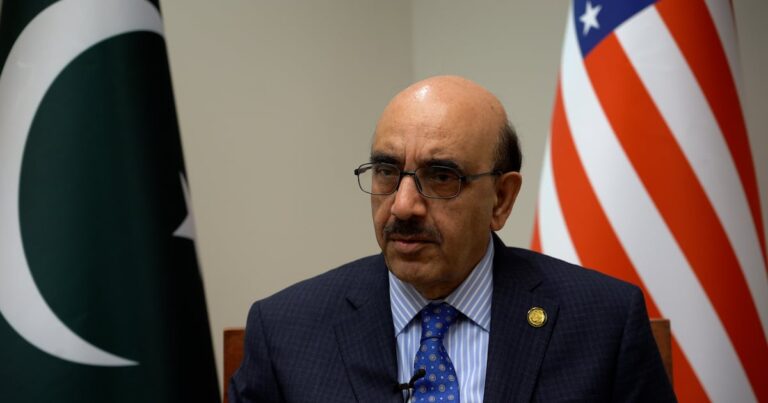The United States should urgently provide Pakistan with additional military equipment to counter rising attacks by the Pakistani Taliban, Islamabad’s envoy to Washington has said.
Ambassador Masood Khan also said: National He said Israel needs around $100 billion to adapt to the effects of climate change, which is wreaking havoc on the South Asian country through deadly floods and heat waves, and called for the implementation of a “time-bound” two-state solution to end the Israeli-Palestinian conflict.
Pakistan has seen a surge in attacks by the Pakistani Taliban, officially known as the Tehreek-i-Taliban Pakistan (TTP), since the U.S. withdrawal from Afghanistan in 2021.
Islamabad says many of the attacks are launched from Afghan territory, a charge denied by Kabul and the TTP.
“What we need right now is equipment that will help us fight terrorism, the asymmetric threat from the Pakistani Taliban movement and other terrorists,” Khan said in an interview at the Pakistani Embassy in Washington.
“The TTP is using Afghan territory to launch attacks into Pakistan. To stop them, we need sniper rifles, night vision goggles and communication equipment. It was part of our discussions with the US that we should be supported in the region.”
Tensions on the Afghanistan-Pakistan border have further increased since the collapse of a ceasefire between the TTP and Islamabad in 2022, and Khan considers the TTP to be the biggest threat to Pakistan’s security.
Pakistan suffered 409 militant attacks in the first five months of 2024, up 83 percent from the same period last year, according to the country’s Institute for Conflict and Security Studies.
Most of the attacks have taken place in Khyber Pakhtunkhwa province in the northwest and Balochistan province in the southwest. The TTP and the Afghan Taliban are ideologically similar, but the TTP seeks to remove Pakistani government control from Pashtun tribal lands and impose its ultra-conservative interpretation of Islam across Pakistan.
“The Afghan leadership has assured us that it will stop the TTP from launching attacks against Pakistan,” Khan said.
“They have not yet succeeded, but we have had many discussions with them and we hope that they will have the political will and the ability to deliver.”

Despite decades of security cooperation, U.S.-Pakistani relations have never been smooth sailing, especially during the two-decade Afghanistan war, in which the U.S. accused Pakistan of playing a double role by supporting the Afghan Taliban while also reaping billions of dollars in U.S. security assistance.
Relations between the two countries reached a nadir when then-President Donald Trump cut $1.3 billion in security assistance to Pakistan in 2018. Relations have improved slightly under the Biden administration, and in 2022 Congress approved a $450 million sales package to maintain Pakistan’s fleet of F-16 fighter jets.
“We welcomed it and it was a very big signal. We were hoping there would be another sustainment package. But that has not happened yet,” Khan said.
“For decades we have bought many American defense platforms. For the Army, Navy and Air Force, we need to maintain them, so we need spare parts. But we also need new equipment and new platforms. We need planes, helicopters, C-130s.”
Since the Taliban took power in 2021, Pakistan claims the security situation in Afghanistan has improved enough for Afghan refugees living along the Pakistan border to safely return.
Pakistan announced a plan to repatriate illegal aliens in October last year aimed at expelling 1.7 million refugees, many of whom human rights groups say face persecution in Afghanistan.
Khan said US lawmakers had asked about the plan, and that 1.7 million of Pakistan’s 4 million illegal immigrants “must be sent back to Afghanistan.”
“The vast majority of Afghans in Pakistan, about 98 percent, returned voluntarily. There was no need to force them,” said Khan, a Pakistani diplomat and former U.N. ambassador.
“These are illegal refugees who have entered Pakistan without papers or registration… We have been talking about this and explaining it to the people here. [in the US]” “.
Pakistan’s View on Climate Change Mitigation and the Israel-Gaza War
Pakistan has been vocal on the Gaza issue, saying Israel should be held accountable for any war crimes it may have committed.
Khan reiterated his country’s call for a permanent ceasefire and the establishment of aid corridors to help the people of the Gaza Strip.
He also called for a “time-bound formula” to ensure progress towards a two-state solution.
“The United States can lead efforts to ensure the establishment of a Palestinian state and make a two-state solution a reality,” he said.
Khan said recent weather events in Pakistan demonstrate the urgent need for countries to contribute to the Loss and Damage Fund, which becomes operational in 2022. The fund has been established to help people in vulnerable communities recover from the effects of climate change.
Jacobabad in Sindh province is one of the hottest cities on Earth, with temperatures reaching 51 degrees Celsius last year. The deadly heatwave that swept across Southeast Asia hit Pakistan hard, just two years after floods across the country caused more than $30 billion in damages.

“There are lots of ways we can mitigate these damages over time. We just need funding,” he said.
“We need this transformation to a climate-resilient economy. We need at least $100 billion for renewable energy, reforestation, etc.”
Speaking about Pakistan’s economy in general, Khan pointed out several sectors where Islamabad is focusing on to attract more foreign investment, including IT, mining, agriculture and energy.
Pakistan is on track to secure new loans from the International Monetary Fund as macroeconomic factors shift in the country’s favour as it strives for economic growth, the country’s finance minister has said. National During April.
Pakistan’s stock market has soared since reforms agreed with the IMF, nearly doubling in the past year and making it the world’s best-performing in dollar terms.
Islamabad is still finalizing the terms of a new loan from the IMF that could reportedly reach $8 billion.
South Asia battles unprecedented heatwave – see pictures
Updated: June 19, 2024 3:15 PM

